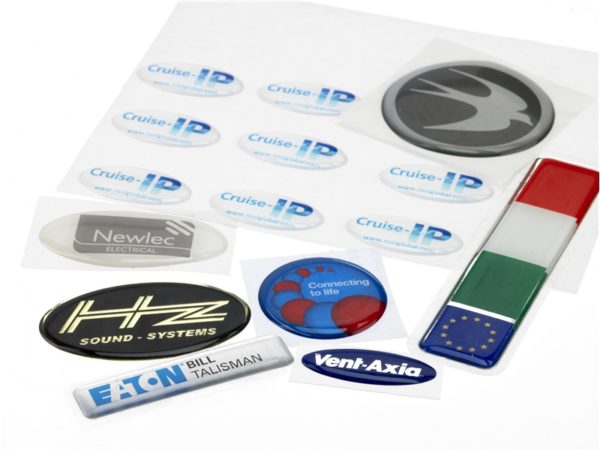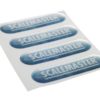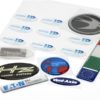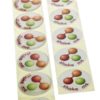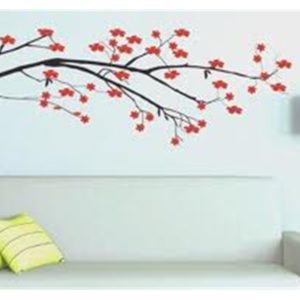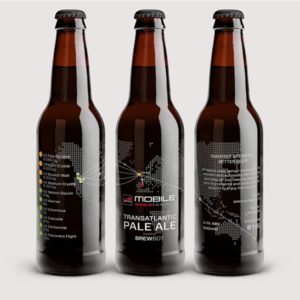Domed Labels
Home / Full Product Range / Full Product Range / Domed Labels
These labels are shatter proof, scratch proof, colourfast, and water resistant. They can be custom printed in spot colours or four colour process, and be of almost any size or shape. They offer very strong adhesion to a variety of surfaces, with an extra high tack adhesive suitable for ribbed or uneven faces.
The uses of domed labels are widespread. including the marking of industrial equipment, nameplates, automotive decals, labelling of computers, printers and other IT equipment, vending machines, name and corporate badges, sports branding, POS displays and signage, and promotional branding.
We can offer large production runs, or cater for short run, multi sort orders. The latest digital technology offers the ability to include variable text or imagery, including unique or sequential coding.
Labelservice also has the ability to take standard labels you have had produced elsewhere, and subsequently add a resin dome. This is proving to be an extremely popular service.
All of our products are backed up with customer service that is second to none, and we pride ourselves on the loyalty of our customer base. Contact Labelservice today for advice, free of charge samples or a quotation on your work.
Domed Labels FAQs
Domed labels, often referred to as dome labels or domed stickers, are a unique form of labelling that adds a three-dimensional appearance to the design. At their core, they are high-quality printed stickers which have been covered with a clear, durable, and often glossy resin. This clear resin forms a dome-like shape over the label, giving it its distinctive appearance.
The process of applying this resin is commonly known as doming, and it results in a product that not only has a tactile and premium feel but also offers increased durability and longevity compared to traditional flat stickers.
Domed labels are crafted from a combination of materials and processes to achieve their distinctive appearance and resilience:
- Substrate or Base Material: This is the primary layer upon which the design or logo is printed. Commonly used materials for the substrate include:
Vinyl: A popular choice due to its flexibility and ability to adhere to various surfaces.
Polyester: Known for its durability and resistance to chemicals and UV radiation.
Polyethylene: Often used for its lightweight and resistant properties.
- Ink: Depending on the intended application and the printer used, various inks can be employed. UV-resistant inks are often favoured as they ensure that the label’s design remains vibrant even after prolonged exposure to sunlight.
- Clear Polyurethane Resin: After the design is printed, a clear liquid resin is applied on top of the label. This resin is what gives the domed label its characteristic three-dimensional appearance. As it cures, the resin transforms from a liquid to a solid, clear, glossy (or sometimes matte) dome. This polyurethane coating is UV-resistant, non-yellowing, and tough, protecting the label from external factors like scratches, weather, and general wear and tear.
Adhesive: The back of the domed label typically contains an adhesive layer to allow it to stick to various surfaces. The choice of adhesive can vary based on where the domed label is intended to be used. For instance, labels meant for outdoor applications would need a stronger, more weather-resistant adhesive compared to those meant for indoor use.
Domed labels are incredibly versatile, making them suitable for a plethora of products across a diverse range of industries. Their durability, tactile appeal, and professional finish make them a popular choice for various applications. Here’s a look at some of the products and industries where domed labels are frequently utilised:
Consumer Electronics: Used on devices such as computers, mobile phones, headphones, and other gadgets to display brand logos or model specifications.
Automotive Industry: Employed on car dashboards, interior components, and under-the-hood parts. Used for branding on alloy wheels or hubcaps.
Home Appliances: Seen on washing machines, ovens, refrigerators, and smaller gadgets like toasters or coffee machines.
Sports Equipment: Incorporated onto items like golf clubs, helmets, bicycles, and other gear to display brand logos or safety information.
Promotional Merchandise: Commonly used for branded items such as keychains, badges, pens, and other promotional products.
Industrial Machinery and Tools: Employed for branding or providing operational instructions.
Musical Instruments: Used on equipment like amplifiers, mixers, or instruments themselves for branding purposes.
Cosmetics and Beauty Industry: Utilised on packaging or on the products themselves, such as on hairdryers or makeup kits.
Medical Equipment: Found on various tools and machines, often for branding or providing important device information.
Boating and Marine: Used due to their resistance to water and UV rays, making them suitable for marine environments.
Point of Purchase Displays: Employed in retail to highlight brands or offer product information in an appealing manner.
Clothing and Footwear: Sometimes used as a branding tool on high-end products or sports gear.
Furniture: Used for branding on both indoor and outdoor furniture pieces.
Domed labels can be completely customisable with popular shapes ranging from rectangular, circular, oval and square. In terms of size, domed labels can range from very small (like those used on electronic components) to much larger labels for bigger equipment or promotional items. The exact size and shape are often customisable based on the client’s requirements and the intended application.
The durability of domed labels is one of their standout features. This durability arises from the combination of materials used and the doming process itself. Here’s are 6 reasons why domed labels are durable:
UV Resistance: The polyurethane resin used in the doming process offers protection against ultraviolet (UV) rays. This ensures that the labels don’t fade or discolour when exposed to sunlight over prolonged periods.
Scratch and Impact Resistance: The dome’s curved shape and the inherent properties of the resin provide a buffer against scratches, dents, and minor impacts. This makes them resilient in environments where they might come into regular contact with other objects.
Chemical Resistance: Domed labels are resistant to most common chemicals, ensuring they remain unspoiled when exposed to substances like oils, solvents, or household cleaners.
Water Resistance: The resin’s non-porous nature creates a watertight seal over the label, making it impervious to moisture and ideal for outdoor or marine applications.
Adhesive Longevity: The adhesives used with domed labels are typically strong and long-lasting, ensuring the label remains affixed to its intended surface for extended periods.
Non-yellowing: Quality domed labels are designed to remain clear and not yellow over time, maintaining their pristine appearance.
Companies use domed labels on products to enhance brand visibility with a premium, durable, and tactile aesthetic, but there are other alternatives as follows:
Metallic and Foil Labels: These labels have a metallic sheen, making them stand out. They are often used for luxury products or to give a premium feel.
Laminated Labels: These have a protective layer on top, enhancing their durability. However, they don’t have the 3D finish of domed labels.
Embossed or Debossed Labels: These labels have raised or recessed patterns, offering a tactile sensation but without the glossy dome finish.
Reflective Labels: These are designed to reflect light and are often used for safety or visibility purposes, like on vehicles or construction equipment.
Holographic Labels: These labels display a 3D hologram effect, making them stand out and often used for security or branding purposes.
These labels are shatter proof, scratch proof, colourfast, and water resistant. They can be custom printed in spot colours or four colour process, and be of almost any size or shape. They offer very strong adhesion to a variety of surfaces, with an extra high tack adhesive suitable for ribbed or uneven faces.
The uses of domed labels are widespread. including the marking of industrial equipment, nameplates, automotive decals, labelling of computers, printers and other IT equipment, vending machines, name and corporate badges, sports branding, POS displays and signage, and promotional branding.
We can offer large production runs, or cater for short run, multi sort orders. The latest digital technology offers the ability to include variable text or imagery, including unique or sequential coding.
Labelservice also has the ability to take standard labels you have had produced elsewhere, and subsequently add a resin dome. This is proving to be an extremely popular service.
All of our products are backed up with customer service that is second to none, and we pride ourselves on the loyalty of our customer base. Contact Labelservice today for advice, free of charge samples or a quotation on your work.
Domed Labels FAQs
Domed labels, often referred to as dome labels or domed stickers, are a unique form of labelling that adds a three-dimensional appearance to the design. At their core, they are high-quality printed stickers which have been covered with a clear, durable, and often glossy resin. This clear resin forms a dome-like shape over the label, giving it its distinctive appearance.
The process of applying this resin is commonly known as doming, and it results in a product that not only has a tactile and premium feel but also offers increased durability and longevity compared to traditional flat stickers.
Domed labels are crafted from a combination of materials and processes to achieve their distinctive appearance and resilience:
- Substrate or Base Material: This is the primary layer upon which the design or logo is printed. Commonly used materials for the substrate include:
Vinyl: A popular choice due to its flexibility and ability to adhere to various surfaces.
Polyester: Known for its durability and resistance to chemicals and UV radiation.
Polyethylene: Often used for its lightweight and resistant properties.
- Ink: Depending on the intended application and the printer used, various inks can be employed. UV-resistant inks are often favoured as they ensure that the label’s design remains vibrant even after prolonged exposure to sunlight.
- Clear Polyurethane Resin: After the design is printed, a clear liquid resin is applied on top of the label. This resin is what gives the domed label its characteristic three-dimensional appearance. As it cures, the resin transforms from a liquid to a solid, clear, glossy (or sometimes matte) dome. This polyurethane coating is UV-resistant, non-yellowing, and tough, protecting the label from external factors like scratches, weather, and general wear and tear.
Adhesive: The back of the domed label typically contains an adhesive layer to allow it to stick to various surfaces. The choice of adhesive can vary based on where the domed label is intended to be used. For instance, labels meant for outdoor applications would need a stronger, more weather-resistant adhesive compared to those meant for indoor use.
Domed labels are incredibly versatile, making them suitable for a plethora of products across a diverse range of industries. Their durability, tactile appeal, and professional finish make them a popular choice for various applications. Here’s a look at some of the products and industries where domed labels are frequently utilised:
Consumer Electronics: Used on devices such as computers, mobile phones, headphones, and other gadgets to display brand logos or model specifications.
Automotive Industry: Employed on car dashboards, interior components, and under-the-hood parts. Used for branding on alloy wheels or hubcaps.
Home Appliances: Seen on washing machines, ovens, refrigerators, and smaller gadgets like toasters or coffee machines.
Sports Equipment: Incorporated onto items like golf clubs, helmets, bicycles, and other gear to display brand logos or safety information.
Promotional Merchandise: Commonly used for branded items such as keychains, badges, pens, and other promotional products.
Industrial Machinery and Tools: Employed for branding or providing operational instructions.
Musical Instruments: Used on equipment like amplifiers, mixers, or instruments themselves for branding purposes.
Cosmetics and Beauty Industry: Utilised on packaging or on the products themselves, such as on hairdryers or makeup kits.
Medical Equipment: Found on various tools and machines, often for branding or providing important device information.
Boating and Marine: Used due to their resistance to water and UV rays, making them suitable for marine environments.
Point of Purchase Displays: Employed in retail to highlight brands or offer product information in an appealing manner.
Clothing and Footwear: Sometimes used as a branding tool on high-end products or sports gear.
Furniture: Used for branding on both indoor and outdoor furniture pieces.
Domed labels can be completely customisable with popular shapes ranging from rectangular, circular, oval and square. In terms of size, domed labels can range from very small (like those used on electronic components) to much larger labels for bigger equipment or promotional items. The exact size and shape are often customisable based on the client’s requirements and the intended application.
The durability of domed labels is one of their standout features. This durability arises from the combination of materials used and the doming process itself. Here’s are 6 reasons why domed labels are durable:
UV Resistance: The polyurethane resin used in the doming process offers protection against ultraviolet (UV) rays. This ensures that the labels don’t fade or discolour when exposed to sunlight over prolonged periods.
Scratch and Impact Resistance: The dome’s curved shape and the inherent properties of the resin provide a buffer against scratches, dents, and minor impacts. This makes them resilient in environments where they might come into regular contact with other objects.
Chemical Resistance: Domed labels are resistant to most common chemicals, ensuring they remain unspoiled when exposed to substances like oils, solvents, or household cleaners.
Water Resistance: The resin’s non-porous nature creates a watertight seal over the label, making it impervious to moisture and ideal for outdoor or marine applications.
Adhesive Longevity: The adhesives used with domed labels are typically strong and long-lasting, ensuring the label remains affixed to its intended surface for extended periods.
Non-yellowing: Quality domed labels are designed to remain clear and not yellow over time, maintaining their pristine appearance.
Companies use domed labels on products to enhance brand visibility with a premium, durable, and tactile aesthetic, but there are other alternatives as follows:
Metallic and Foil Labels: These labels have a metallic sheen, making them stand out. They are often used for luxury products or to give a premium feel.
Laminated Labels: These have a protective layer on top, enhancing their durability. However, they don’t have the 3D finish of domed labels.
Embossed or Debossed Labels: These labels have raised or recessed patterns, offering a tactile sensation but without the glossy dome finish.
Reflective Labels: These are designed to reflect light and are often used for safety or visibility purposes, like on vehicles or construction equipment.
Holographic Labels: These labels display a 3D hologram effect, making them stand out and often used for security or branding purposes.



